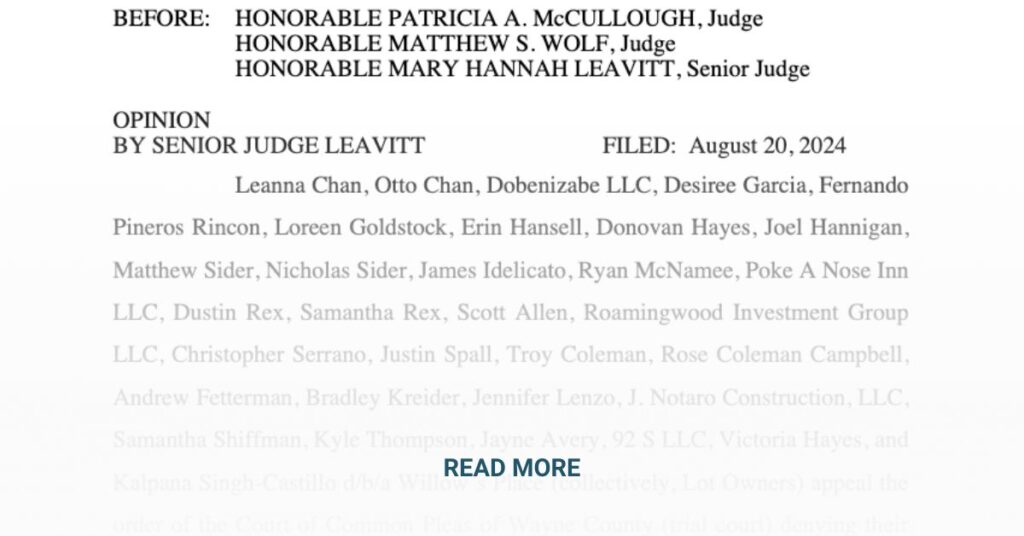Updated on April 9, 2025
In a far-reaching win for property rights, the Pennsylvania Supreme Court recently rejected an application for appeal from a homeowners association that had sought to restrict short-term rentals in a Poconos planned development in violation of its governing documents.

Executive Director of the Poconos Association of VRO
“This ruling is a major victory for our homeowners and a clear message that community associations cannot impose unauthorized restrictions that strip property owners of their rights,” said Ricky Cortez, a Pennsylvania STR advocate and Executive Director of the Poconos Association of Vacation Rental Owners. “It upholds the fundamental principle that governing documents must be followed as written and cannot be arbitrarily rewritten to serve shifting agendas.”
Background
The Hideout, a planned community of 3,200 single-family homes in Wayne County, had covenants dating back to 1970 that allowed homeowners to rent out their properties without restrictions. But in 2022, the association adopted new bylaws that made it much harder to operate a short-term rental by limiting short-term rental activity to 10 times per year, according to court documents.
Homeowners challenged the new rules, arguing they violated what the original documents allowed.
When the case first went to a trial court in Wayne County, the judge sided with The Hideout. The homeowners appealed the ruling to the Pennsylvania Commonwealth Court in Chan v. The Association of Property Owners of The Hideout, Inc.

Appellate court ruling sets a precedent
In August 2024, the Pennsylvania Commonwealth Court ruled that the homeowners’ association overstepped its authority by trying to restrict vacation rentals in the community and ordered the lower court to officially void the STR restrictions.
“This decision sets a crucial precedent, ensuring that similar restrictions cannot be imposed without clear, explicit authority in the governing documents, thereby protecting the interests of property owners across Pennsylvania,” Eric Smith, a partner at Timoney Knox who represented homeowners in the appeal, wrote in a blog post analyzing the ruling.
In simple terms, Eric said that if your neighborhood’s founding documents don’t specifically ban short-term rentals, the HOA can’t invent new rules to do so.
The Supreme Court’s rejection of the homeowners’ association’s application for appeal in February 2025 means the appellate court’s order can now move forward, Eric explained.
The outcome represents a victory for his clients and STR hosts across the state.
“This ruling is significant because it reinforces homeowners’ rights against overreach by community associations, particularly regarding short-term rental restrictions,” Eric said.
Eric noted three major points the appellate court made during its ruling.
Firstly, the term “single-family dwelling” isn’t a ban on short-term rentals.
The Hideout’s original documents require single-family dwellings. The HOA argued that this means homes can’t be used for short-term rentals, but the court disagreed. A “single-family dwelling” describes the type of building, not whether it’s used as a primary residence, secondary home, or a short-term rental, Eric explained.
The court said that if the community wanted to ban STRs, it would have had to say that clearly in its documents. Because it didn’t, the association couldn’t enforce a ban after the fact.
Secondly, the new rules conflicted with existing documents.
The court found that the new short-term rental restrictions directly conflicted with the original declaration. Under Pennsylvania law, the declaration always wins if it disagrees with newer bylaws. In other words, if a bylaw goes against the community’s founding rules, it can’t be enforced, Eric explained.
Lastly, homeowners didn’t lose their rights just because they waited. Even though The Hideout had been enforcing these rules for some time, that didn’t mean the homeowners lost their right to challenge them. That’s because the original declaration included a clause that prevents homeowners from losing their rights just because time has passed.
Eric encourages homeowners across Pennsylvania to check their community’s governing documents carefully and seek legal help if they suspect their association is unfairly regulating short-term rentals.
The ruling was a major win and an energizing boost for Pennsylvania STR advocates.
“For our members and STR operators across the Poconos and Pennsylvania, this sets an essential precedent – ensuring fair, transparent, and lawful governance in planned communities,” Ricky said. “We remain committed to protecting the rights of responsible vacation rental owners and pushing back against regulatory overreach that threatens our industry and the broader regional economy.”
…


